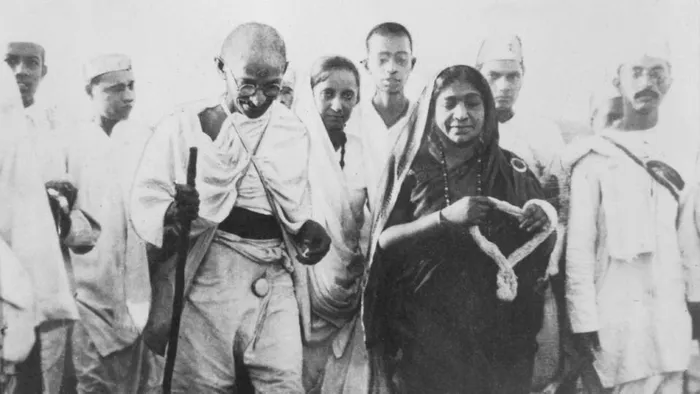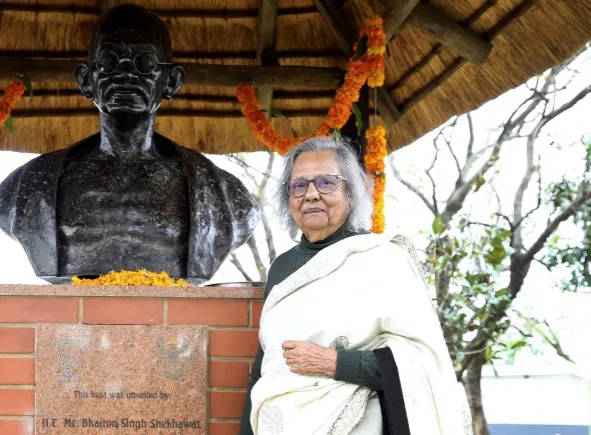A journey of peace: the significance of the Salt March
20th anniversary

Mahatma Gandhi with Sarjojini Naidoo, a powerful leader in the Indian struggle, during the Salt March.
Image: Supplied
IN 2005, there was a resurgence of interest around the world in nonviolence. It was the 75th anniversary of the famous Dandi March organised by Mahatma Gandhi. Many peace activists began to consider observing this anniversary in some symbolic way and to re-commit to nonviolence and peaceful means of resolving conflict.
In Durban, a group of people came together under the banner of the Gandhi Development Trust to re-enact this famous march and dubbed it the Gandhi Luthuli Salt March. It symbolically joined the 50th anniversary of the Freedom Charter, drawn up in 1955 in Kliptown at the Congress of the People, with the 75th anniversary of the Dandi March.
The Freedom Charter was drawn up at a time when Chief Albert Luthuli was president of the ANC. This prompted the name Gandhi Luthuli Salt March and in short, the Annual Salt March.
This year, we recall that 95 years ago on April 6, 1930, Mahatma Gandhi and 78 volunteers began their nonviolent defiance march from Sabarmathi Ashram in Ahemdabad in India to the coastal town of Dandi. This turned out to be one of the largest and most effective defiance campaigns in the world in which millions of people throughout India participated by defying the unjust monopoly on salt by the British colonisers of India.
The British not only prohibited the manufacture of salt but also imposed a tax on it.
Salt is an essential ingredient on the table of every person regardless of status, race, class, caste or gender. This prohibition affected everyone, and the act of defiance against this law spread like wildfire across the length and breadth of India, drawing millions into this nonviolent campaign involving the making of salt.
The band of 78 trained volunteers together with Gandhiji walked through hundreds of villages for 241 miles and for 24 days mobilising the communities as they marched, making their way to the seaside village known as Dandi. There they began to manufacture their own salt.
Gandhiji led the march and having made the salt, he picked up a fistfull of salt and said to a captive audience of international and local journalists: "With this I will shake the foundation of the British Empire."
The impact of this little act was unprecedented. Not only was India shaken into action but the injustice of this law drew the attention of the world. There was widespread publicity throughout the country and the international press covered the stories of this protest. Attention was particularly drawn to the atrocities committed by the police.
The unarmed peaceful protesters were beaten up, arrested and imprisoned. Mounted police stormed the marchers and threw blows on their heads but no one raised a hand to retaliate. Instead,, as the wounded fell, survivors continued to march and new bands of people came in.
Sixty thousand people were imprisoned as a result of this civil disobedience and eventually the British were forced to agree to negotiate a settlement and the path to freedom of India was charted. India won its freedom 17 years later on August 15, 1947.
The Dandi march has served as a beacon of hope to millions around the world who chose to use nonviolent means to attain freedom and it continues to inspire nonviolent resisters all over the world.
We in South Africa too, mounted many nonviolent struggles. We also opted for a negotiated settlement. Let us be aware of the fact that the alternate could have been as ghastly and devastating as Gaza. We see the devastation of war in other parts of the world where not only people die but the entire environment is damaged to the extent that rebuilding from the destruction becomes a nightmare.
Significantly in 2008, a pledge was made by the participants of the 5th Salt March. We reproduce a summary of it: "War and violence are destroying the lives of millions of people in the world. While thousands are killed, families are left destitute to suffer untold misery and deprivation. Further the violence of greed exploitation and corruption is causing poverty, misery and environmental degradation among millions who are left homeless and without work or shelter. We pledge our solidarity with the millions who have died and the billions who are living a life of poverty and we rededicate ourselves to the moral, and spiritual philosophy of nonviolent resistance against war, violence, greed and exploitation."
From the outset, the Durban Salt March Committee agreed that this march would carry a clear message of peace, nonviolence, ubuntu, reconciliation and social cohesion, that in that spirit the march would be non-competitive and that it would not be a march to raise funds, but to draw everyone, rich and poor, to the march in solidarity.
This march carries the message of the Freedom Charter. In particular, it draws attention to the important clause of the Charter which says: "South Africa shall strive to maintain world peace and the settlement of all international disputes by negotiation-not war. Peace and friendship amongst all our people shall be secured by upholding the equal rights, opportunities and status of all, within the country, in Africa and internationally."
As we witness the inequalities in our society today, the widening gap between the wealthy and the poor, as we see the many challenges that our society faces in terms of access to basic necessities of life such as work, security, shelter, nourishment caring and education, we realise that although we are liberated, there is still much that we need to do to achieve both our dreams and the dreams of our forefathers, who sacrificed so much that South Africa may attain freedom.
The Salt March 2025, in celebrating its 20th anniversary, seeks to invoke the spirit of compassion and love that all our scriptures speak about, so that together we can rid our community of corruption, of crime, of violence, and of wanton vandalism and build a strong, peaceful nation where ubuntu can once again prevail across the country among all South Africans.
If this is your dream too, then let's get together in this march and contemplate on how we can together make a difference.
The march start will start on May 25 at the Gandhi Phoenix Settlement in Bhambayi, Inanda, at 7.30am. Secure parking will be available at the Gandhi Luthuli Peace Park in Phoenix, from where a shuttle will bring you to the Gandhi Settlement. The march is a 4.5km walk from the Gandhi Settlement to the Gandhi Luthuli Peace Park.

Ela Gandhi
Image: File
Ela Gandhi is the chairperson of the Gandhi Development and Phoenix Settlement Trusts.
** The views expressed do not necessarily reflect the views of IOL or Independent Media.
Related Topics: